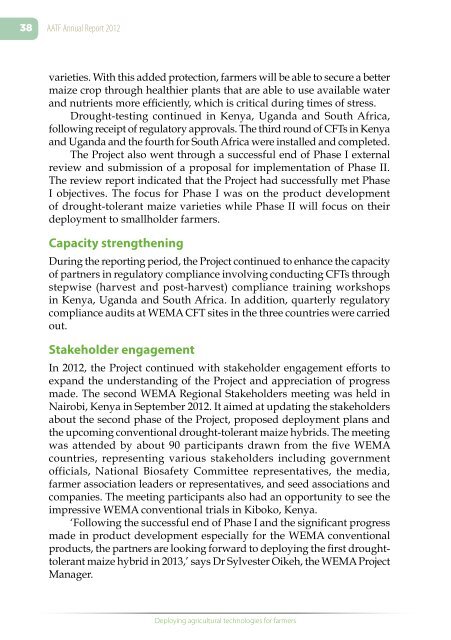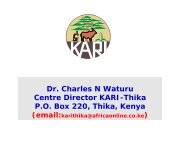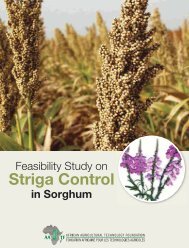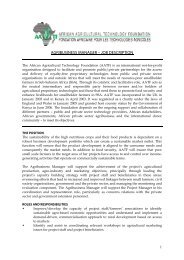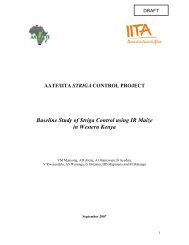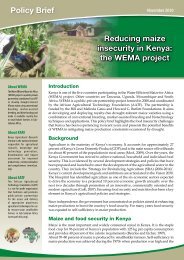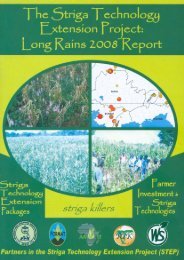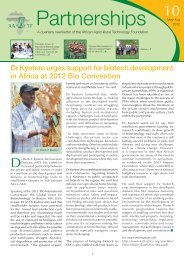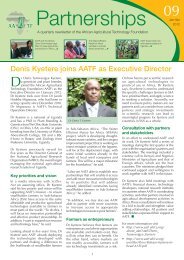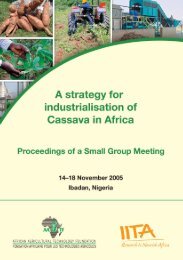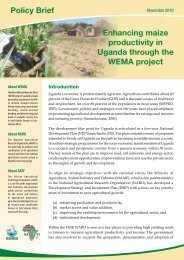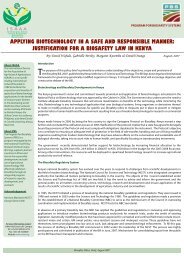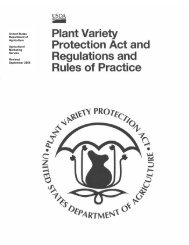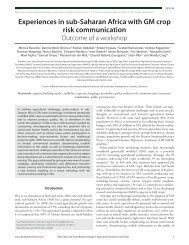Annual Report 2012 - African Agricultural Technology Foundation
Annual Report 2012 - African Agricultural Technology Foundation
Annual Report 2012 - African Agricultural Technology Foundation
You also want an ePaper? Increase the reach of your titles
YUMPU automatically turns print PDFs into web optimized ePapers that Google loves.
38 AATF <strong>Annual</strong> <strong>Report</strong> <strong>2012</strong><br />
varieties. With this added protection, farmers will be able to secure a better<br />
maize crop through healthier plants that are able to use available water<br />
and nutrients more efficiently, which is critical during times of stress.<br />
Drought-testing continued in Kenya, Uganda and South Africa,<br />
following receipt of regulatory approvals. The third round of CFTs in Kenya<br />
and Uganda and the fourth for South Africa were installed and completed.<br />
The Project also went through a successful end of Phase I external<br />
review and submission of a proposal for implementation of Phase II.<br />
The review report indicated that the Project had successfully met Phase<br />
I objectives. The focus for Phase I was on the product development<br />
of drought-tolerant maize varieties while Phase II will focus on their<br />
deployment to smallholder farmers.<br />
Capacity strengthening<br />
During the reporting period, the Project continued to enhance the capacity<br />
of partners in regulatory compliance involving conducting CFTs through<br />
stepwise (harvest and post-harvest) compliance training workshops<br />
in Kenya, Uganda and South Africa. In addition, quarterly regulatory<br />
compliance audits at WEMA CFT sites in the three countries were carried<br />
out.<br />
Stakeholder engagement<br />
In <strong>2012</strong>, the Project continued with stakeholder engagement efforts to<br />
expand the understanding of the Project and appreciation of progress<br />
made. The second WEMA Regional Stakeholders meeting was held in<br />
Nairobi, Kenya in September <strong>2012</strong>. It aimed at updating the stakeholders<br />
about the second phase of the Project, proposed deployment plans and<br />
the upcoming conventional drought-tolerant maize hybrids. The meeting<br />
was attended by about 90 participants drawn from the five WEMA<br />
countries, representing various stakeholders including government<br />
officials, National Biosafety Committee representatives, the media,<br />
farmer association leaders or representatives, and seed associations and<br />
companies. The meeting participants also had an opportunity to see the<br />
impressive WEMA conventional trials in Kiboko, Kenya.<br />
‘Following the successful end of Phase I and the significant progress<br />
made in product development especially for the WEMA conventional<br />
products, the partners are looking forward to deploying the first droughttolerant<br />
maize hybrid in 2013,’ says Dr Sylvester Oikeh, the WEMA Project<br />
Manager.<br />
Deploying agricultural technologies for farmers


